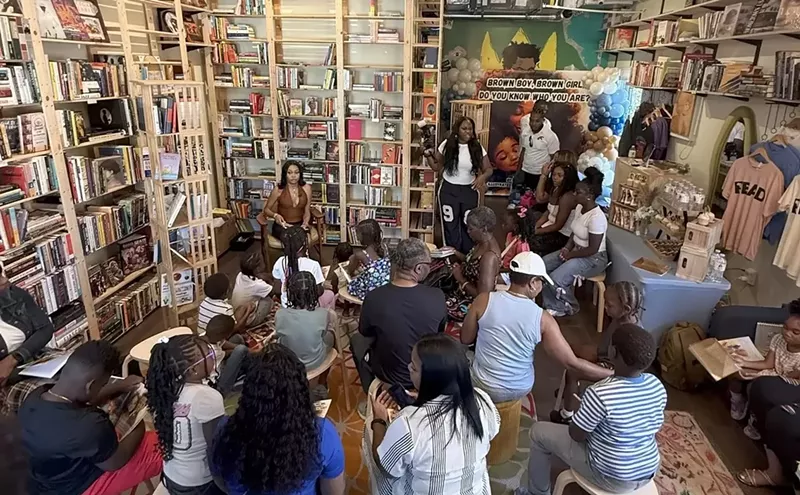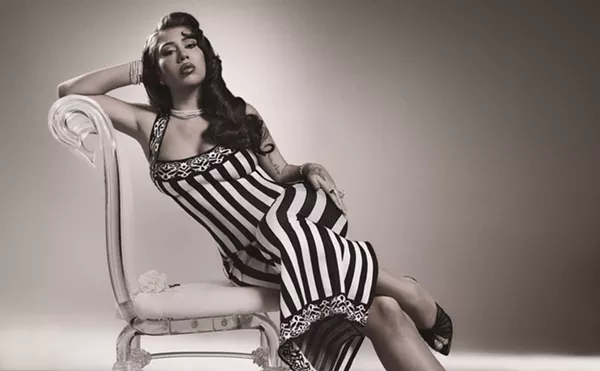The setting of John Patrick Shanley's Savage in Limbo is a seedy bar in the Bronx, circa 1986. As interpreted by the Alliance Theatre Lab's set designer, Adalberto Acevedo, we've all seen this bar before, usually when we've had nowhere else to go. It's not a place of entertainment — the jukebox is out for repairs, and there's an unseen pool table that is always available — so much as a pit stop on the route to oblivion: a sorrow-drowning destination for the lonely, the maligned, the jilted.
Acevedo includes a number of insightful little details, including a garish Heineken sign, pool cues racked up on the wall, and business cards tacked onto a corkboard. On stage right sits a withering plant that probably hasn't bloomed since the Carter administration, and on stage left, unlit Christmas lights snake atop the bar, even though the action takes place in autumn. Those lights will eventually have a narrative purpose, but I liked them better when they didn't — when they evoked the laziness of the bar owners, who let the lights hang there through January and February, and then through spring and summer, and then through fall, which is only natural, because the holidays are just around the corner again then, right?
It's in this familiar milieu that two forces of nature burst forth, two very '80s women with thin waistlines, short tempers, big hair, and bigger mouths: Denise Savage (Shira Abergel) and Linda Rotunda (Valentina Izarra). On this night — an unbroken, 90-minute one-act — Abergel's Denise seems to overtake the room in a dervish, like a junkie in need of a fix, but that's just the way she is. She's forever in the midst of an existential crisis, and she can't go anywhere else because nobody else gets her. Linda likewise blasts through the door like a gust of bitter wind — nobody enters calmly at this bar — dressed in hooker-chic attire, blinding lipstick, meretricious makeup. Part of Izarra's costume is a tight leopard-print skirt, appropriate for a character who pounces like an untamed animal at anything that sounds like an affront.
At any rate, Linda no longer holds much appeal to her boyfriend, Tony; as she relates it to Denise, Tony has taken a sudden interest in "ugly girls," a concept as initially laughable as Denise's big revelation of the night: that she's a virgin at 32. These women don't know each other, but they know of each other, having graduated the same year from the same Catholic school. They hold nothing back in their assessments of each other's character, spouting some of Shanley's most cuttingly comic dialogue: "You get knocked up every time you stop walking," admonishes Denise.
But tonight, they are fellow travelers in states of similar malaise, discussing the possibility of rooming together with the bar's only other denizen: April (Breeza Marena Zeller), a once-promising student at the same Catholic school who has become a professional drunk. Director Adalberto Acevedo even has Zeller passed out on the bar before the show officially begins, reinforcing her sense of perpetual stupor.
The fastidious barkeep, Murk (Christian Vandepas), acts as April's enabler and caretaker. He's a cipher who walks with an intriguing and never-explained limp; whether this detail comes from Shanley's source material or Acevedo's direction, it works at injecting mystery into his character. Eventually Tony (Curtis Belz) enters the picture, a restless lunkhead with too much to say, most of it bullshit. That doesn't stop all three women, at one point or another, from vying for his scrambled affections.
There isn't much of a plot in Savage in Limbo; it's an entirely character-driven showcase closer to life than theater in that it never feels ordered. It's more of a Möbius strip of communal urban despair, albeit one that is often laugh-out-loud funny. Still, while the play is always intellectually stimulating, it's also emotionally aloof. There's something missing in Savage in Limbo, something to viscerally connect audiences to Shanley's vision.
I'm convinced that this disconnection is present in the text and not in Alliance's superb production; this is quite simply one of the best-produced plays I've seen on its stage. It's a bar-setting work (no pun intended) for ensemble acting in this region, perhaps the most cohesive team of actors assembled in a play since Zoetic Stage's All New People, back in January. Even the occasional mistakes and line flubs feel so real that they should be included in Shanley's script. As a result, the 90 minutes fly by.
The three women are especially outstanding. Izarra and Abergel are expert sparring partners, cut from similar cloths but clashing in texture. Both can speak a mile a minute, and both erect protective fronts and expose hidden vulnerabilities; the major difference is that Izarra's performance springs from the heart and Abergel's from the brain, choices that resonate deeply with their characters. Zeller's performance, meanwhile, springs from her Brandy Alexanders. She's a crushingly sad April, a permanently soused role that could easily have spiraled into parody. But she keeps it grounded, finding her character's illness and arresting us with just about every word.
This sort of acting can be a challenge because the characters don't change much, continuing to scream into a void. Shanley doggedly resists storybook conclusions, though, for some of the characters, there may finally be a sliver of light in their future. Then again, considering that the play ends with the forced anticlimax of closing time — upturned chairs positioned back into place, the Heineken sign shut off — these poor souls may just show up tomorrow and do it all again.












